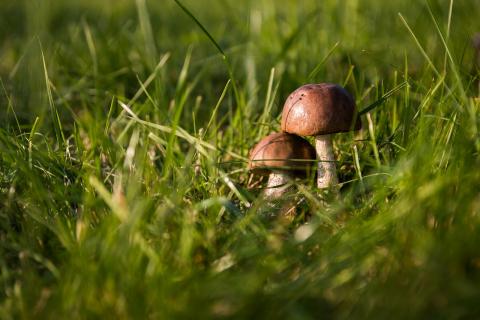Why are there so many mushrooms coming up in my yard and garden, and what can I do about them?

The most important thing to understand about mushrooms is that they are simply the above-ground fruiting bodies of fungi that live in the soil. The vast majority of fungal mass is below ground where it goes unseen and unnoticed until mushrooms emerge. The vast majority of fungi are beneficial. They are decomposers that break down dead and decaying organic matter such a stumps, old roots, or leaves. Most mushrooms do not damage lawns or gardens; they are simply an unsightly nuisance.
Mushrooms only grow when environmental conditions are just right. Prolonged periods of wet, humid weather, such as we have had over the past few weeks, cause fungi to send up fruiting structures. Fungi disperse to new areas via windblown spores. When the spores land in a suitable location they develop into new fungi which will grow mushrooms given enough time.
Mushrooms will go away on their own once the weather dries out. Keep in mind that although these fruiting bodies have disappeared, the fungal mycelia is still growing in the soil. The fungus will continue to grow and persist as long as there is plenty of organic matter to feed upon. Mushrooms will emerge again as soon as the growing conditions are right, which may not be for another year. If you are unwilling to wait for mushrooms to go away on their own, you can remove them by hand or with the lawn mower. Although removing the mushrooms themselves does nothing to affect the fungi in the soil, it will reduce the number of spores released into the environment and the number of new mushrooms in different areas of the lawn and garden. Fungicides are generally not recommended because they are largely ineffective and mushrooms aren’t damaging anyway.
It's also worth mentioning that many mushrooms are poisonous. Never eat an unknown mushroom unless you are absolutely confident of your identification skills. If you do decide to try eating wild mushrooms, be very cautious and only eat a small amount initially. Even mushrooms that are purportedly edible can make some people very ill.
Got questions? The Ask UNH Extension Infoline offers practical help finding answers for your home, yard, and garden questions. Call toll free at 1-877-398-4769, Monday to Friday, 9 a.m. to 2 p.m., or e-mail us at answers@unh.edu.
Do you love learning about stuff like this?
SUBSCRIBE TO Granite State Gardening newsletter
Got questions? The UNH Extension Yard and Garden Infoline offers practical help finding answers for your yard and garden questions.
Call toll free at 1-877-398-4769, Monday to Friday, 9 a.m. to 2 p.m., or fill out webform.
